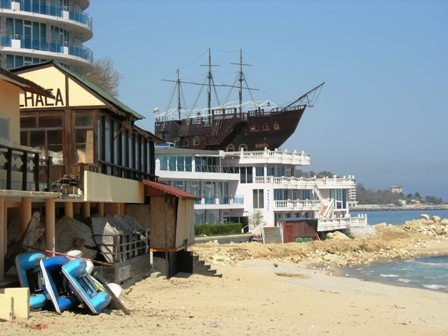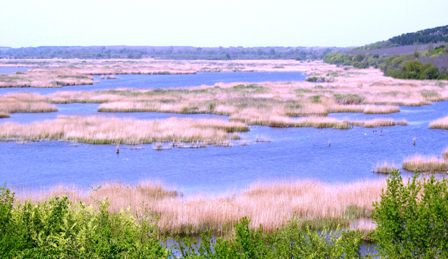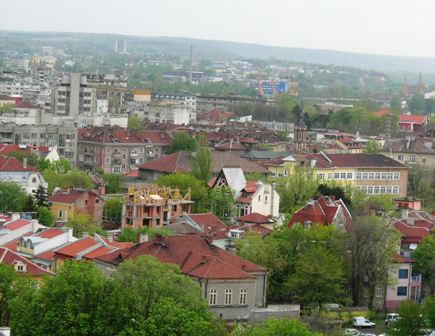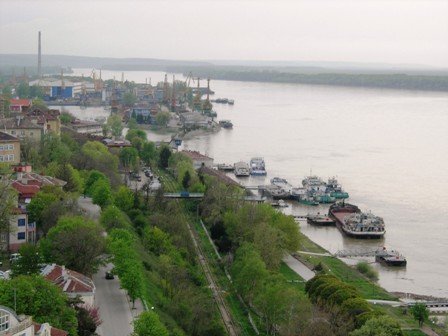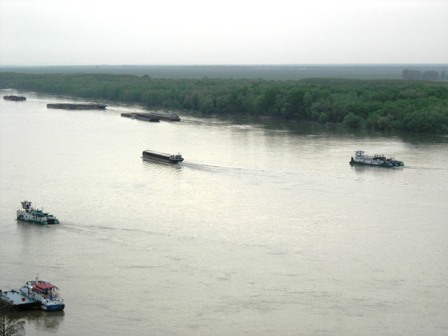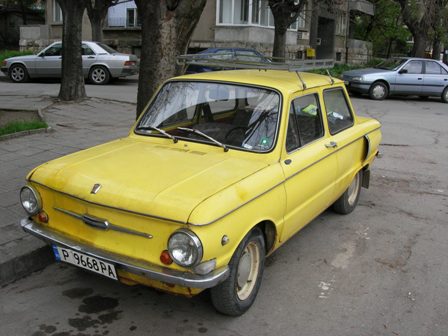Black Sea, Warm Heart
A trip to the Bulgarian Black Sea coast does not impress Mike and Jo with the state of development.7 9 April 08
.
We had planned to spend two days in the Bulgarian centre of Plovdiv, but early on the second day it started raining and kept raining for the next 48 hours. Despite a hotel room slightly smaller than a shoebox, we settled in to watch cable TV, read and wait. We ventured down to the bar only for beer and braved the weather outside only to eat.
.
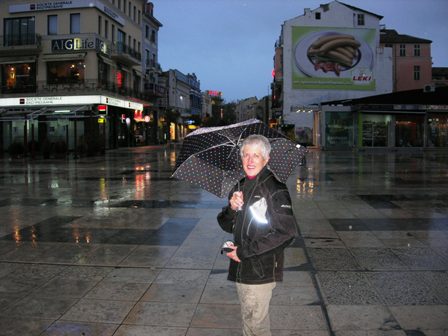
.
Jo ventures out to hunt and gather in torrential rain at Plovdiv. Riding jackets are better in the rain than our down jackets.
.
On our third night we decided that we would head to the Black Sea coast the next day, rain or no, and went to bed listening to the steady beat of the storm against the window. I slept fitfully, waking every hour or so and looking out to see the rain heavy and consistent. Sometime not long before dawn, however, the rain cleared and we woke to crystal skies and an icy wind that was slowly drying the roads.
.
We bolted. The road to the Black Sea coast runs across the black soil of the Thracian Plain. This expanse of fertile flat-lands covers one third of Bulgaria and runs north to the border and the Danube River Delta. It also explains the historic wealth of these lands and why Thracian wines were world famous before the Romans had introduced grapes to the Gauls. We rolled through the major coastal city of Burgas and cruised south into the little coastal town of Sozopol in the early afternoon. It started to rain shortly after.
.
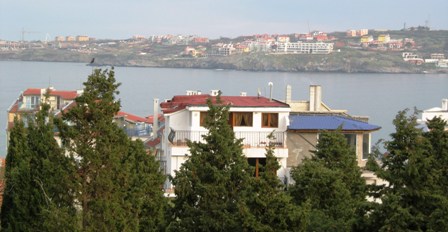
.
The town of Sozopol has been developed for many years and has a seedy Bondi look about it; although, the lack of surf gives it away.
.
For the next two days we explored the 200km that constitutes the Bulgarian Black Sea coast. The first thing we noticed was that we were asked routinely if we were visiting to buy an apartment or land. There are real estate agents everywhere specialising in selling property to Western Europeans. We didnt bother to tell the locals that living where we do in Australia, the Black Sea coast isnt great value at any price.
.
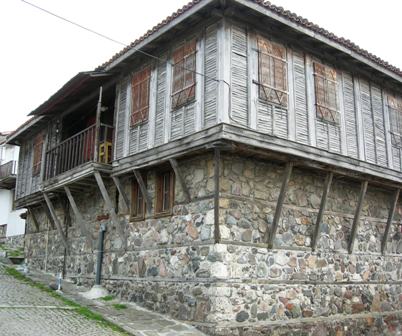
.
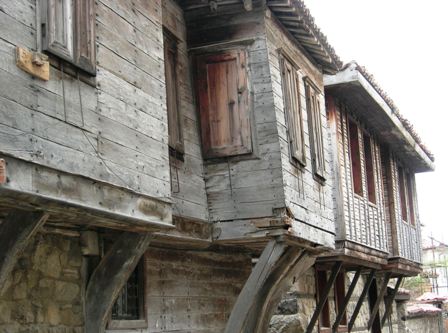
.
A few older villages on the Black Sea are being restored to show the traditional pine over stone architecture but most of the coast is being pulled down to make way for new development.
.
Most of the coast is a construction site. Huge villa and resort developments are underway to satisfy the insatiable appetite of poor UK or German sods who missed the cheap deals in Spain and just want a place in the sun; a cheap place in the sun. For about £150 k you too could buy a three bed apartment on a hill, some distance from the sea, but with a sea view. The further up the coast we rode the more depressed we became.
.
.
This monstrosity of a resort has a faux ship built out from the hotel containing the restaurant and other facilities needing a little ambiance.
.
In our explorations down back roads (oh the joys of being an independent traveller) we found two overgrown old holiday camps dating back to the communist days. They had the look of military camps with low-set huts and communal facilities. They were almost laughable compared with the huge resort developments just a few kilometres up the coast. But as we discussed our discovery we realised that our best family holidays had never been in resorts. It seemed to us that most families could have as much of a memorable holiday at Comrade Butlins as they could at the Ramada Black Sea Resort.
.
We were too depressed by all of this to stay on the coast. We think that this will all end badly for the Bulgarians. Between boorish Westerners and corrupt local officials the whole of the coast will soon be alienated from the ordinary people and Bulgaria will be poorer for it. We headed north-west away from the coast, back into the rural heartland to close-up on the Danube River.
.
.
We found the Srebarna Wetlands on our way north. In a country as small as Bulgaria, there are few areas for wildlife so this was a pleasant place for a lunch stop.
.
After a ride halfway across the country (not so far really) we reached the Danube and the Bulgarian frontier at the town of Ruse. We took a room on the 13th floor of an old Soviet era hotel that was ridiculously expensive and falling apart. It did, however, give us a wonderful view over the city, the river and the port.
.
.
The old city of Ruse was a pleasant (grounded) experience after the coast.
.
.
The river port at Ruse was quiet while we were there but we do like a room with a view over a port any time.
.
.
Some barge trade still goes up and down the Danube but up until 100 years ago the river was the means of most trade and cultural exchange. We reckon its thanks to the river that the Bulgarians and Romanians make such good beer!
.
We spend our last day in Bulgaria wandering around the old city while I snapped some shots of some of the old Soviet era cars that are still on the roads.
.
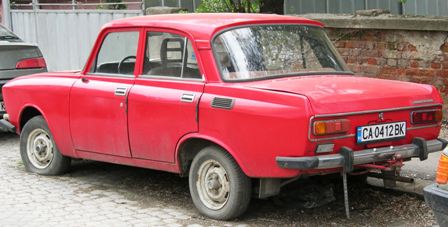
.
The ubiquitous Ladas still keep going despite their age and the beating they get from the locals.
.
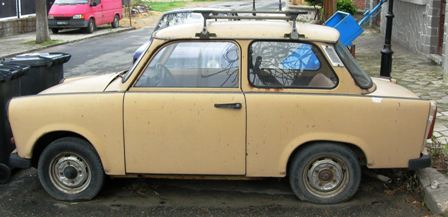
.
This is the iconic East German Trabant. These are now a cult car in Germany complete with restoration clubs and specialist parts suppliers.
.
.
I didnt know what this one was. Perhaps it is an old Dacia Renault knock-off. If you know please let me know.
.
Bulgaria had been a pleasant surprise for us. Despite the difficult language and Cyrillic script, we were very comfortable there. The people were genuinely friendly and pleased that we were not just there to buy a cheap apartment. The wine was fine. The beer was beaut. And, we fed ourselves well and often. A good result all round.
.
The most telling comparison for us in this country was not between city wealth and rural poverty. Rather, it was between the cities with their ample and well ordered Soviet era parks and public spaces, and the coastal areas where rampant capitalism will soon alienate the entire coastline from the Bulgarian people. A stifling communist administration never had much to recommend it, but neither does the unfettered development now underway.

